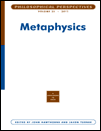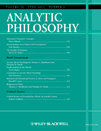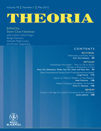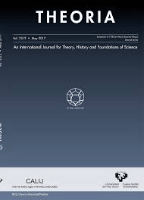
Constructivist Foundations
metrics 2024
Empowering Scholars to Transform Educational Landscapes
Introduction
Constructivist Foundations is a distinguished academic journal dedicated to exploring the intersection of constructivist theories and interdisciplinary applications. Established in 2010 and published by ALEXANDER RIEGLER in Belgium, this journal aims to provide researchers, educators, and professionals with a platform to disseminate innovative ideas about learning, cognition, and scientific philosophy. With a focus on artificial intelligence, cognitive neuroscience, education, and the history and philosophy of science, Constructivist Foundations has made strides in contributing to meaningful discussions within these Q2 and Q3 ranked fields. Although it currently holds a Q4 status in several areas, it plays a crucial role in fostering knowledge and dialogue among scholars, thereby enhancing the understanding of constructivist principles across various domains. With robust academic engagement and open access options, this journal continues to shape the future of educational and cognitive research.
Metrics 2024
 0.17
0.17 2.20
2.20 1.90
1.90 24
24Metrics History
Rank 2024
Scopus
JCI (Web Of Science)
Quartile History
Similar Journals

SYNTHESE
Championing excellence in scholarly contributions.SYNTHESE is a prestigious academic journal published by Springer, renowned for its contributions to the fields of Philosophy and Social Sciences. With a distinguished history dating back to its inception in 1936, this journal continues to thrive, offering a platform for innovative and critical discourse. Recognized for its excellence, SYNTHESE holds a remarkable Q1 quartile ranking in both Philosophy and Social Sciences (miscellaneous) as of 2023, placing it within the top tier of scholarly publications. Its impressive Scopus rankings further underscore its influence, boasting a rank of #48 out of 806 in Philosophy and #70 out of 275 in General Social Sciences, thereby reflecting a 94th percentile in the arts and humanities. The journal's scope encompasses a wide array of interdisciplinary and philosophical inquiries, making it a vital resource for researchers, professionals, and students seeking to deepen their understanding of complex social issues. With access options that promote scholarly connectivity, SYNTHESE is committed to advancing knowledge and fostering intellectual engagement within the global academic community.

Philosophical Perspectives
Innovating the landscape of philosophical dialogue.Philosophical Perspectives is a premier academic journal published by WILEY, dedicated to advancing the field of philosophy through innovative and rigorous research. Established more than two decades ago, this esteemed UK-based journal carries the ISSN 1520-8583 and E-ISSN 1758-2245, and it has earned a reputation for quality, as reflected in its ranking in the top quartile (Q1) for philosophy. With an impressive Scopus rank of #152 out of 806 and a respectable 81st percentile standing, it is a significant platform for scholars seeking to disseminate their findings and contribute to philosophical discourse. The journal's objectives include fostering critical thought and interdisciplinary dialogue, making it an essential resource for researchers, professionals, and students alike. Although it does not currently offer open access options, its content is meticulously curated to ensure relevance and depth, covering a wide array of philosophical topics from ethics to metaphysics. As a vital part of the philosophical community, Philosophical Perspectives continues to shape the future of philosophical inquiry and practice.

Wiley Interdisciplinary Reviews-Cognitive Science
Bridging disciplines for deeper cognitive understanding.Wiley Interdisciplinary Reviews-Cognitive Science (ISSN: 1939-5078, E-ISSN: 1939-5086), published by WILEY, stands as a premier academic journal dedicated to advancing the understanding of cognitive science through an interdisciplinary approach. Since its inception in 2010, the journal has rapidly established itself as a leading source of knowledge, achieving a Q1 ranking in the 2023 category of Medicine, Neuroscience, and Psychology, underscoring its significant impact within these fields. With a Scopus ranking of #27 in General Psychology and #30 in General Neuroscience, it offers researchers, professionals, and students access to cutting-edge research that bridges various disciplines, fostering collaboration and innovation. Though not openly accessible, this journal is critical for those aiming to stay at the forefront of cognitive science research, providing comprehensive reviews that synthesize emerging findings and highlight future directions for study.

Analytic Philosophy
Championing High Standards in Philosophical ResearchAnalytic Philosophy is a prestigious journal published by Wiley, dedicated to advancing critical discourse in the realm of philosophy. With an ISSN of 2153-9596 and an E-ISSN of 2153-960X, this journal has rapidly established itself as a vital resource for researchers, professionals, and students seeking to explore contemporary philosophical debates and analytic methods. Operating from the heart of the United States, located at 111 River St, Hoboken, NJ, it holds an impressive Q1 classification in the field of philosophy for 2023, ranking #190 out of 806 within Scopus's Arts and Humanities category, placing it in the top 76th percentile. The journal’s commitment to rigor and innovation makes it an essential platform for thought-provoking research and discussions in analytic philosophy. Researchers will appreciate the journal’s high standards and its significant impact within the academic community.

Organon F
Catalyzing interdisciplinary conversations in philosophy.Organon F is a distinguished open-access journal dedicated to the advancement of philosophical discourse and inquiry. Published collaboratively by the Institute of Philosophy of the Slovak Academy of Sciences and the Institute of Philosophy of the Czech Academy of Sciences, this journal promotes innovative and critical approaches to a wide range of philosophical topics. With its establishment in 2002 and continuous commitment to academic rigor, Organon F has rapidly ascended through the ranks, currently holding a Q2 classification in the field of Philosophy according to the Scopus database, ranking 279 out of 806 journals with a commendable 65th percentile standing. The journal is pivotal in fostering interdisciplinary dialogue and serving as a reliable source of scholarly research, making it an essential resource for researchers, professionals, and students alike. Its open-access format since 2010 ensures that cutting-edge philosophical insights are readily available to a global audience, empowering the academic community to engage with and contribute to ongoing debates in contemporary philosophy.

Theoria-A Swedish Journal of Philosophy
Advancing the Boundaries of Philosophical ThoughtTheoria - A Swedish Journal of Philosophy, published by WILEY, stands as a significant contributor to the realm of philosophical discourse since its inception in 1935, with a continued commitment to advancing scholarly conversation up to 2024. With its ISSN 0040-5825 and E-ISSN 1755-2567, the journal holds a prestigious position in the field, ranking in Q2 among philosophy journals and achieving an impressive 66th percentile ranking in the Scopus Arts and Humanities category. Although it does not currently provide Open Access options, Theoria remains a vital resource for researchers, professionals, and students seeking in-depth analyses and innovative perspectives within contemporary philosophy. Its central objective is to foster rigorous academic dialogue that explores diverse philosophical inquiries, making it an essential platform for those invested in the pursuit of knowledge and critical thought.

THEORIA-REVISTA DE TEORIA HISTORIA Y FUNDAMENTOS DE LA CIENCIA
Unveiling the Past to Illuminate the Future of ScienceTHEORIA-REVISTA DE TEORIA HISTORIA Y FUNDAMENTOS DE LA CIENCIA, published by the Servicio Editorial Universidad del País Vasco, is a leading open access journal dedicated to advancing the fields of History, Philosophy of Science, and related disciplines since its inception in 2003. With a robust impact factor placing it in the esteemed Q1 and Q2 quartiles in its respective categories, this journal serves as a crucial platform for researchers, professionals, and students who are engaged in profound discussions and analyses of scientific foundations and historical contexts. Based in Spain, THEORIA has consistently demonstrated its commitment to scholarly excellence, achieving notable rankings in Scopus, particularly in the fields of Arts and Humanities, where it holds a rank of #169 in Philosophy and #59 in History and Philosophy of Science. The journal not only allows immediate open access to its diverse range of articles, fostering global knowledge dissemination, but also aims to bridge connections across varied philosophical inquiries and historical explorations within science. Join the dialogue today in shaping the future understanding of our scientific heritage.

Journal for General Philosophy of Science
Elevating Scholarly Conversations on Science and PhilosophyJournal for General Philosophy of Science, published by Springer, stands as a pivotal resource in the fields of History and Philosophy of Science, as well as general Philosophy. With an impressive Q1 ranking in its categories and a solid reputation reflected in its Scopus rankings, this journal provides a robust platform for scholarly discourse and advancement in philosophical inquiry regarding science. The journal's commitment to quality is evident, catering to researchers, professionals, and students interested in the critical examination of scientific methods, theories, and their implications. While it operates on a subscription basis, the journal is dedicated to fostering a deeper understanding of philosophical issues surrounding scientific practices from 1980 through 2024. Operating out of the picturesque Netherlands, specifically from VAN GODEWIJCKSTRAAT 30, 3311 GZ DORDRECHT, the journal continues to encourage innovative thinking and interdisciplinary dialogue, underscoring its significance in academia today.

Epistemology & Philosophy of Science-Epistemologiya i Filosofiya Nauki
Navigating the Complexities of Knowledge and UnderstandingEpistemology & Philosophy of Science-Epistemologiya i Filosofiya Nauki is a prestigious journal published by the Russian Academy of Sciences - Institute of Philosophy, dedicated to advancing the discourse in the fields of epistemology, philosophy of science, and related disciplines. With a distinguished presence in academia, this journal is recognized for its exceptional contributions, evident through its categorization as a Q2 journal in Arts and Humanities and Philosophy, and a Q1 journal in Cultural Studies. Covering an expansive scope from 2017 to 2023, it facilitates a vital dialogue among scholars and professionals aiming to explore the intersections of knowledge, culture, and education. Although currently not open access, the rigorous peer-review process ensures that only high-quality research is published, enriching the intellectual landscape. The journal's commendable rankings in Scopus, particularly in Arts and Humanities and History and Philosophy of Science, reflect its commitment to scholarly excellence. For researchers, educators, and students, Epistemology & Philosophy of Science serves as an essential resource for understanding and contributing to the ongoing philosophical dialogues that shape our comprehension of scientific inquiry.

Philosophies
Championing interdisciplinary approaches to philosophy.Philosophies is a leading open-access journal published by MDPI, dedicated to advancing research in the fields of Philosophy and the History and Philosophy of Science. Established in 2016 and located in Switzerland, this journal aims to stimulate scholarly dialogue and innovation by providing a platform for diverse philosophical perspectives and interdisciplinary approaches. With a commendable impact factor and ranking—Q2 in both Philosophy and History and Philosophy of Science in 2023—Philosophies stands out in the academic community with Scopus rankings placing it in the top tiers of its categories (Rank #176/806 in Philosophy and Rank #65/223 in History and Philosophy of Science). Authors and researchers are encouraged to submit their works as this journal continues to foster open access to knowledge, enabling global dissemination and collaboration among experts and enthusiasts alike. Join us in exploring the profound questions that shape our understanding of the world and human experience.